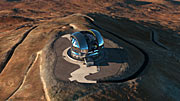Annuncio
Inizia la pianificazione degli strumenti MOS e HIRES per E-ELT
Il più grande telescopio del mondo avrà la migliore strumentazione del mondo
23 Marzo 2016
Scienziati e ingegneri hanno iniziato a elaborare le specifiche dettagliate di due nuovi strumenti che faranno parte della prima serie di strumentazione del futuro telescopio dell'ESO E-ELT (European Extremely Large Telescope). MOS (lo Spettrografo Multi-Oggetto) e HIRES (lo Spettrografo ad alta risoluzione) saranno gli strumenti principali leader mondiali su quello che sarà il più grande telescopio del mondo.
Il contratto per gli studi iniziali del progetto per MOS è stato firmato il 18 Marzo 2016 dall'ESO e dal CNRS-INSU, l'istituzione principale nel consorzio MOSAIC [1]. Lo strumento combinerà l'alta risoluzione spettrale e spaziale e realizzerà survey a grande campo nella parte visibile e infrarossa dello spettro. Esso permetterà agli astronomi di esplorare alcuni dei profondi misteri dell'Universo: quando si sono formate le prime galassie e come si sono aggregate per formare le strutture più grandi come la Via Lattea; come è distribuita la materia ordinaria e la materia oscura nell'Universo; e come si formano ed evolvono i pianeti intorno ad altre stelle?
Il contratto per iniziare gli studi del progetto per HIRES è stato firmato il 22 Marzo 2016 dall'ESO e dal consorzio HIRES, guidato dall'INAF [2]. HIRES è uno spettrografo ad alta risoluzione, che opera simultaneamente nelle lunghezze d'onda ottiche e infrarosse, che verrà usato per studi estremamente accurati e dettagliati di oggetti individuali. Per esempio, consentirà agli astronomi di: studiare le atmosfere dei pianeti intorno ad altre stelle alla ricerca di segni di vita; esplorare l'evoluzione delle galassie; identificare i segni della primissima generazione di stelle nell'Universo primordiale; capire se alcune delle costanti fondamentali della fisica, che regolano la maggior parte dei processi fisici nell'Universo, cambiano realmente con il tempo.
I due consorzi sono tra i più grandi ad aver mai collaborato alla produzione di strumenti astronomici, dimostrando gli sforzi multinazionali coinvolti nella realizzazione di questi spettrografi.
Strumenti di questo tipo rappresentano i componenti essenziali di ogni telescopio moderno — questi esemplari leader mondiali sfrutteranno al meglio la luce dell'enorme specchio primario di 39 metri dell'E-ELT, consentendo di ottenere prestazioni mai realizzate.
Note
[1] Il consorzio MOSAIC comprende istituti da 11 paesi:
GEPI e LESIA, Observatoire de Paris; Laboratoire d’Astrophysique de Marseille; IRAP, Tolosa, ONERA (Francia); UK Astronomy Technology Centre, STFC; RALSpace, STFC; L'Università di Oxford; Durham University (UK); IAG, San Paolo; National Astrophysics Laboratory, Itajuba (Brasile); Università di Amsterdam; NOVA, Osservatorio di Leiden, Universiteit Leiden (Olanda); Leibniz Institute for Astrophysics Potsdam e Goettingen University (Germania); Università di Helsinki, Turku e Oulu (Finlandia); Università di Stoccolma, Lund e Uppsala (Svezia); Complutense University di Madrid e Instituto de Astrofísica de Andalucía-CSIC (Spagna); INAF-Osservatorio Astronomico di Roma (Italia); Vienna University (Austria); Instituto de Astrofisica e Ciências do Espaço - Universidade de Lisboa and Universidade do Porto; CENTRA (Portogallo)
[2] Il consorzio HIRES comprende istituti da 12 paesi:
Board of Observational Astronomy, Federal University of Rio Grande do Norte; Mauá Institute of Technology (Brasile); Pontificia Universidad Catolica de Chile, Centre of Astro Engineering; Universidad de Chile, Department of Astronomy; Universidad de Concepcion, Center of Astronomical Instrumentation; Universidad de Antofagasta, Unidad de Astronomía (Cile); Niels Bohr Institute at the University of Copenhagen; Institute of Physics and Astronomy at the University of Aarhus (Danimarca); Laboratoire d’Astrophysique de Marseille; Institut de Planétologie et d’Astrophysique de Grenoble; Laboratoire Lagrange de l’Observatoire de la Côte d’Azur (Francia); Leibniz Institute for Astrophysics, Potsdam; Institut für Astrophysik, Universität Göttingen; Zentrum für Astronomie Heidelberg, Landessternwarte; Thüringer Landesternwarte Tautenburg; Hamburger Sternwarte, Universität Hamburg (Germania); Istituto Nazionale di AstroFisica (Italia — istituto leader); Nicolaus Copernicus University in Toruń, Faculty of Physics, Astronomy and Informatics (Polonia); Instituto de Astrofísica e Ciências do Espaço - Universidade do Porto and Universidade de Lisboa (Portogallo); Instituto de Astrofísica de Canarias; Instituto de Astrofísica de Andalucía-CSIC; Centro de Astrobiología (Spagna); Department of Physics and Astronomy, Uppsala University (Svezia); Université de Genève, Département d’Astronomie (Observatoire de Genève); Universität Bern, Physikalisches Institut (Svizzera); Cavendish Laboratory University of Cambridge; Institute of Astronomy University of Cambridge; UK Astronomy Technology Centre; Centre for Advanced Instrumentation - Durham University; Institute of Photonics and Quantum Sciences (School of Engineering and Physical Sciences, Heriot-Watt University) (Regno Unito)
Contatti
Richard Hook
ESO Public Information Officer
Garching bei München, Germany
Tel: +49 89 3200 6655
Cell: +49 151 1537 3591
Email: rhook@eso.org
A proposito dell'annuncio
| Identificazione: | ann16017 |

